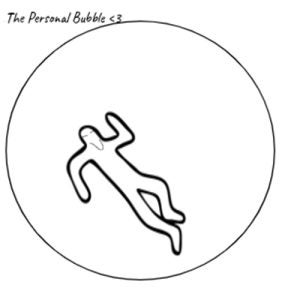Fiona Apple, jazzy-pop phenom whose sensational career began in the 90s and is continuing on strong a good 30 years later, set a boundary with her fans recently. Apple, who has struggled in the past with mental health, abuse, and love lost, incorporates a lot of these complex and painful themes into her music. This “no topic is hands off,” attitude, as well as her swinging vocals and swaying rhythms, has garnered for Apple a loyal fanbase of sensitive women entranced by her poetry. However, some of the enchanted began using her songs to make trivial Tik Toks, despite the serious turmoil Fiona went through in order to conceive her aching lyricism and jarring piano riffs. So, because people took the rawest depictions of her very soul and passed them around like shiny hot-potatoes, the musician removed all of her music from the app.
 Setting boundaries, on every level it can possibly be done, is always difficult. Even when, as in Ms. Apple’s case, it is as tangibly simple as pushing a button. There is often backlash, and sometimes the entitlement of others will swarm over something that both is and should be entirely your own. College is definitely a trial in regards to developing the adult skill of boundary-setting. In a lot of ways you learn to survive on campus through the people you make friends with, and as I have dealt with myself, this can result in a social enmeshment that can be detrimental to your school work, extra-curricular activities, and even branching out past your initial friend group. All of these are conducive to a well-rounded college experience, and even in doing them independently one still needs some time purely to themself to just think; to do things like reflect upon events of the day, to organize the rest of their day, to figure out when during the day they can carve out just a sliver of food or sleep for themselves in between class and schoolwork. Not to mention the sheer chaos that is coordinating constant activities for yourself and your little ‘people pod,’ along with the tyrannical current of FOMO that has swept up, by and large, 80% of our age group. Not everyone abides by the tide of the masses, but weekends early on in your college career will likely fall in tune with the rapidity of everyone’s desire to be seen, and even more importantly, invited.
Setting boundaries, on every level it can possibly be done, is always difficult. Even when, as in Ms. Apple’s case, it is as tangibly simple as pushing a button. There is often backlash, and sometimes the entitlement of others will swarm over something that both is and should be entirely your own. College is definitely a trial in regards to developing the adult skill of boundary-setting. In a lot of ways you learn to survive on campus through the people you make friends with, and as I have dealt with myself, this can result in a social enmeshment that can be detrimental to your school work, extra-curricular activities, and even branching out past your initial friend group. All of these are conducive to a well-rounded college experience, and even in doing them independently one still needs some time purely to themself to just think; to do things like reflect upon events of the day, to organize the rest of their day, to figure out when during the day they can carve out just a sliver of food or sleep for themselves in between class and schoolwork. Not to mention the sheer chaos that is coordinating constant activities for yourself and your little ‘people pod,’ along with the tyrannical current of FOMO that has swept up, by and large, 80% of our age group. Not everyone abides by the tide of the masses, but weekends early on in your college career will likely fall in tune with the rapidity of everyone’s desire to be seen, and even more importantly, invited.
So here are my tips and tricks:
1. Social Media — Have your location off by default. (This excludes Find My Friends for purposes of safety when going out and dating and whatnot. You should absolutely always make sure that at least one person should be able to see your last location when going out on weekends or meeting up with anyone from dating apps for safety reasons.) Make yourself a little unavailable. Someone trying to keep you in check by minding or asking you about your whereabouts isn’t allowing you the freedom that you need to experience in the pristine and uninterrupted condition that will allow you to flourish in college. Post when you’re happy enough, or genuinely are having enough fun, to independently decide to post. It makes for better quality pictures, and maintains an air of mystery. Be the enigma that makes people wonder what you’re doing, instead of showing everyone what you’re doing, at a rate which emphasizes the degree to which you are doing so many things, because you’re so cool; you know? The air of mystery is maintained both when one is actually partying, and when one is spending a Saturday night of solace recharging in the comfort of your bed.

2. Time management — However much time you spend on homework and school work, spend as much time on your own just — and I cannot think of a more effective way to express this — straight chilling, either before or after you hang out with people that day. Just take some time to do the basic thinking thing. Plan out the work you’ll have to do the next day in the order you’ll have to do it, consider which dining hall to go to later with your friends, scroll a little, squeeze in 30 minutes of video games or a good book: just kill some time with you, yourself, and you. If it’s a heavy workload day and you don’t have the time to get as much me-time as you spend on school work, and you’re itching for some social interaction or discussion about anything other than the content of your study guide, you obviously don’t have to abide by this rule. Time management is hard in itself, this is just a nice little rule that helps you step into the semester with some balance.

3. Separate plans when necessary– Everyone, at one point in time, will have a friend so entrenched in FOMO that they will refuse to be anything but miserable on uneventful weekends. You can feebly attempt to rouse their energy all you want, but if there isn’t a party to go to or a place to be seen, they will sit and mope and be miserable all night long. Don’t try to pull this person out of their elected misery, and when it comes to making plans outside of your relationship with this person, do not extend them the decency of the invite. This might sound harsh to some, but there is no guarantee that they won’t just bring their negativity out with you, and find disappointment at whatever gathering that you allowed them to ride your coattails to attend. Additionally, when any friend begins acting in a way that you find to be inconsiderate or just plain annoying, it is a good idea to keep them away from other core friendships that you might be cultivating. When freshman year friendships end (or college friendships in general) they rarely simmer out, but rather crash and burn. Doing some damage control like this in advance when a friend begins acting erratically party-obsessed, is often a way better and less taxing option than confronting them.

4. Stick to your tasks of the day – The basics of everyday living are often self-enforced during this transitional period of life. You have to hold yourself to necessities like stopping by the store for toiletries and groceries, spending an hour at the library to complete an assignment or study for an exam, going to the gym like you said you would, so on and so forth; and if you want company for these activities, by all means invite some friends! But if no one is available to come with, still go. Walking across campus alone can surely be intimidating, but it is only through cultivating private spheres of life that you become comfortable within them. Existing on your own, though not always, is one of those trials of adulthood that you have to just deal with. The more comfortable you get in solitude, the more appreciation you will have for time with others.
The balancing act of college, between social life, personal time, academics, and extra curricular, is referred to as such for a reason: it is hard! Even in utilizing all the above tips and tricks you may still find the hustle and bustle of college life runs you ragged, and even that is totally fine. What is important is that you are taking care of yourself, and are not letting either FOMO or a desire for academic excellence get in the way of that. Make adjustments as necessary, have fun, rest when you need it, and keep balance. That is all the advice I can give you after almost three years here.
My name is Samantha Melia and I am a junior, double-majoring in journalism and political science. I am also working toward a minor in philosophy! I write in my free-time and I have always loved to do so,  whether it is completely creative writing, stories, or more academic essays. Some of my poetry can be found on my instagram account @poetryslamsam, here I showcase some of my favorite pieces from a portfolio that I began compiling during my sophomore year of highschool, and still add to regularly to this day. I am also an avid hiker who most easily finds peace of mind deep in the woods far away from other people. Over the pandemic I developed a special interest in mycology, the study of mushrooms, which is funny because I do not consider myself scientifically-minded by a mile. Pictures of the mushrooms and fungi I’ve found on my hikes can be seen on another secondary Instagram account I have, aptly dubbed @urifungylady (fungi is purposely spelled incorrectly to cue to the fact that I am, in fact, a funky lady). Eventually, I’d like to use my education for a good purpose, and do some form of advocacy journalism internationally. The world is increasingly uncertain, and many other people think there isn’t much that can be done to make it a better place. I am no authority on whether or not those people’s assertions about the state of the world are incorrect, but I think the job of a journalist is incredibly important, and that truth brings light. If it doesn’t make the world a better place, it can at least help us to see a little clearer.
whether it is completely creative writing, stories, or more academic essays. Some of my poetry can be found on my instagram account @poetryslamsam, here I showcase some of my favorite pieces from a portfolio that I began compiling during my sophomore year of highschool, and still add to regularly to this day. I am also an avid hiker who most easily finds peace of mind deep in the woods far away from other people. Over the pandemic I developed a special interest in mycology, the study of mushrooms, which is funny because I do not consider myself scientifically-minded by a mile. Pictures of the mushrooms and fungi I’ve found on my hikes can be seen on another secondary Instagram account I have, aptly dubbed @urifungylady (fungi is purposely spelled incorrectly to cue to the fact that I am, in fact, a funky lady). Eventually, I’d like to use my education for a good purpose, and do some form of advocacy journalism internationally. The world is increasingly uncertain, and many other people think there isn’t much that can be done to make it a better place. I am no authority on whether or not those people’s assertions about the state of the world are incorrect, but I think the job of a journalist is incredibly important, and that truth brings light. If it doesn’t make the world a better place, it can at least help us to see a little clearer.
